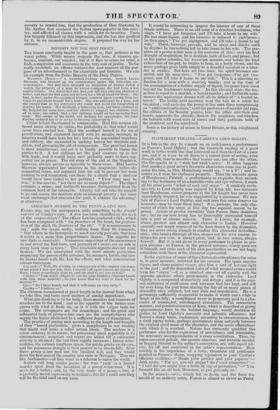HONESTY NOT THE BEST POLICY. .
THE lesson constantly taught to the poor is, that patience is the worst policy. While misery respects the laws, it remains un known, unpitied, and unaided ; but if it flies to crime for relief, it finds compassion and assistance in the very seat of justice. To the really wretched, an offence without the cost answers all the purpose of an advertisement to the charitable and humane. We cite an example from the Police Reports of the Daily Papers.
MANSION HOUSE.-" A wretched-looking woman, named Louisa Sherwin, was brought up for examination under the following cir cumstances. She had been charged on suspicion of having stolen a
watch, the property of a man in whose company she had been a few nights before. She stated that she had just left two starvin,, children at home, and that she had come out to look for a bit of bread for them. She had, in fact, under the craving of hunger, resolved upon issuing from her room to prostitute herself for a trifle. She was addressed by a man, and she owned that in her extremity she could not resist the temptation of stealing his watch. Her husband, a labouring man, had been confined in the hospital for some time, and her efforts to suppert her children, were all in vain ; she added, that a few shillings would set her up in the fruit trade. The owner of the watch not making his appearance, Sir John Penning ordered her to he set up in business immediately."
Crime is here the channel to compassion. Had this woman adhered more strictly to virtue, the probability is, that relief would never have reached her. Had she confined herself to the sin of prostitution, and contented herself with its meagre earnings, its miseries would have been her lot ; but as she superadded treachery and robbery, she succeeded in making known her destitute condition, and procuring the aid of compassion. The practical lesson is most mischievous, and yet it is hardly possible to blame the parties to it. A few shillings set the poor creature up in her little trade, and it would have cost probably more to have supported her in prison. The old story of the girl at the Magdalen, however, always occurs as apposite to these cases. Had Louisa Sherwin represented her miseries to the magistrate before she committed crime, and implored him for aid to prevent her from yielding to evil temptation, can there be a doubt that a deaf ear would have been turned to her petition ? "Your story may be true," is the answer, "but there are so many objects !" The object commits a crime, and forthwith becomes distinguished from the common herd of the miserable. Charity will not take the trouble to go and survey the destitute state of innocent poverty ; but when want exchanges that character for guilt, it obtains the advantage of observers.


















 Previous page
Previous page